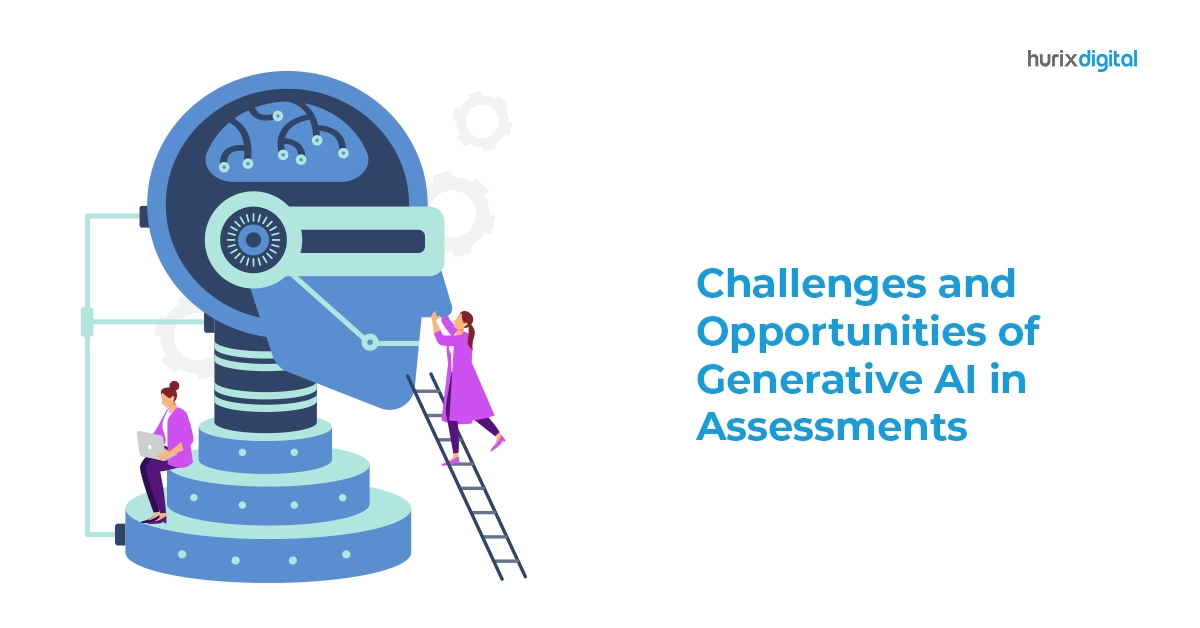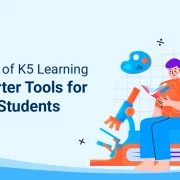
Challenges and Opportunities of Generative AI in Assessments
Summary
Analyze the challenges and opportunities presented by generative AI in assessments, including its potential to enhance assessment processes and address current limitations.
AI is revolutionizing every industry, and the education industry is no exception. In the education industry, AI is transforming the core activities of learning and assessment.
Assessments play a vital role in the education system. They help educators track students’ academic progress, identify learning gaps, and provide valuable feedback to students.
With conventional pen-and-paper exams no longer being effective for evaluation, new technological solutions, especially generative AI, have taken over the cumbersome task of assessment.
While the integration of new technology comes with a number of benefits, the challenges don’t stay far behind. In this blog, we will delve into the benefits of AI in education, specifically for assessments, and the challenges it presents for educational institutions.
Table of Contents:
- Benefits of Using Generative AI in Assessments
- Challenges Presented by the Use of Generative AI in Assessments
- Future Prospects: Overcoming the Challenges
- The End Note
Benefits of Using Generative AI in Assessments
Generative AI models use machine learning and natural language processing algorithms to generate text, images, videos, and other forms of content.
Using generative AI in education for assessments can benefit learners and educators in a number of ways, such as the following:
1. Produces Personalized Assessments
Traditional assessments follow a one-size-fits-all approach, neglecting to make an accommodation for individual differences.
Unlike this, generative AI tools take individual differences into account and gather information about students’ different learning needs and learning styles.
After gathering information, they analyze it to design personalized assessments that cater to each student’s capabilities and proficiency. Text AI tools make assessments that are neither too easy nor too difficult for students to attempt, keeping them motivated throughout.
2. Gamifies the Assessment-Taking Experience
Generative AI can make it possible for teachers to gamify the assessment-taking experience for students. Incorporating gamification will introduce the elements of challenges and rewards in assessments.
When students complete challenges in an assessment, they will get rewarded with points, badges, and recognition on the leaderboard. This experience will only motivate students to keep learning and attempting assessments regularly.
Also, since each new assessment is designed at a level above the students’ last performance, students have scope for revision and improvement.
3. Generates a Range of Assessments
In a traditional system of assessments, educators are restricted to assigning pen-and-paper tests to students, leaving little to no room for variety.
With generative AI in education, however, educators can develop a range of assessments, including interactive quizzes, class polls, multiple-choice questions, case studies, word clouds, and more.
Educators can develop these different kinds of assessments for a variety of subject matters, including math, science, language, history, coding, and many more.
4. Automates the Grading of Assessments
Generative AI tools, unlike traditional assessment methods, can automate the grading of assessments.
While doing that, the tools make use of automatic composition grading to evaluate the quality of the text, level of coherence, correctness of grammar, and many other aspects of the text.
Research reveals that free generative AI tools like ChatGPT can reduce grading time, maintain consistency in scoring, and provide immediate scores and feedback to students on their writing skills.
Also Read: AI-Enabled Assessment: Redefining Evaluation in Education
Challenges Presented by the Use of Generative AI in Assessments
Now that you are aware of the benefits of AI in education, it’s time to become aware of the various challenges associated with the use of generative AI tools.
According to research, the key issues often cited with the use of GenAI tools like ChatGPT include plagiarism and the threat to the accuracy and reliability of content.
Let’s explore these issues and some other challenges in detail.
1. Threat to Academic Integrity
Students can use AI text generator tools to come up with answers for assessments.
Since GenAI tools pick content from the internet, the possibility of the content generated by them and subsequently used by students being plagiarized is quite high. In addition, the content generated can sometimes be inaccurate or misleading.
GenAI tools, thus, end up propagating unethical use of authored content without proper citations and sometimes the use of inaccurate and unreliable content, thereby posing a serious threat to academic integrity.
2. Perpetuation of Biases
GenAI tools are trained on large sets of data. If the data contains biases, AI-generated text will also contain biases. This means that the questions for assessments produced by GenAI tools will be biased.
Alternatively, if students use GenAI tools to complete assessments, their responses will also be biased. Thus, in this way, GenAI tools lead to the perpetuation of biases in educational institutions.
3. Lack of Data Privacy
GenAI systems often require and store data about students’ academic performance, learning styles, and behavioral patterns. GenAI systems can be easily hacked into, leaking sensitive information about students.
This raises concerns about a lack of data privacy and strengthens the need for taking strong protective measures from early on.
4. Limit Development of Essential Skills
AI-generated text provides quick solutions to assessment-based questions.
Over-reliance on this easy way of completing assessments can negatively impact students’ higher-order thinking abilities. It can also limit the development of essential skills like critical thinking, problem-solving, and more.
Also Read: Transforming Education with Smart Classrooms: The Role of AI
Future Prospects: Overcoming the Challenges
While the challenges of generative AI threaten serious consequences, they can still be tackled with the help of some changes and additions in educational institutions, as follows:
Establishment of Ethical Review Processes:
These processes can address GenAI-related ethical concerns and formulate guidelines for the ethical use of GenAI in education for assessments.
Continuous Monitoring and Evaluation:
This involves monitoring the database used by GenAI tools, ensuring it doesn’t perpetuate biases and rather protects data privacy with strong security measures.
This also involves evaluating the effectiveness of GenAI tools in curating assessments and improving students’ learning outcomes.
The End Note
Despite the challenges, the future of GenAI in education looks bright. According to Statista, the generative AI market is expected to grow exponentially, becoming a 207 billion-dollar industry by 2030.
Considering the numerous benefits of AI in education as well as the potential for overcoming its challenges, it’s high time to incorporate GenAI for assessments into your educational institutions. If you want help doing so, reach out to Hurix Digital.
Hurix Digital provides custom assessment solutions to meet the needs of the students in your educational institution. The SMEs and AI-powered tools at Hurix Digital can curate question banks and a variety of interactive assessments to help you provide a fun, captivating, and engaging assessment-taking experience to your students.
As a firm believer in providing quality online assessment solutions, Hurix Digital is a partner of companies like Carnegie Learning, McGraw Hill, Cambridge University Press, and more.
To know more about AI-powered assessment solutions, get in touch with Hurix Digital.

Vice President – Digital Content Transformation. He is PMP, CSM, and CPACC certified and has 20+ years of experience in Project Management, Delivery Management, and managing the Offshore Development Centre (ODC).



